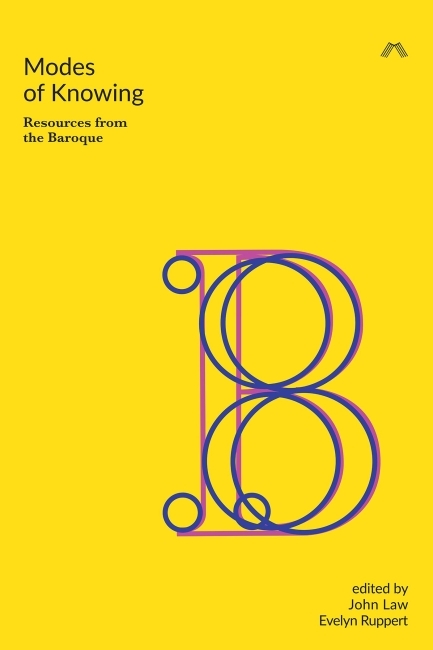
Modes of Knowing: Resources from the Baroque
Edited by John Law and Evelyn Ruppert
Published: July 2016
– Buy paperback (£18) – delivery time approximately 1 week (not the longer timelines currently displayed on Amazon)
– Download pdf (Mattering Press is a registered charity. For those who can, please consider making a donation to support the press)
– ePub, Mobi, and HTML versions available shortly
A new collection that asks: how might we think differently? It brings together leading scholars in the social sciences all of whom are interested in non-standard modes of knowing. The resource for doing this that the various contributions direct their attention to is the baroque. Rather than formulating a ‘baroque social science’ whatever that might be, they instead work in a range of ways to explore how drawing on the ‘resources of the baroque’ can help us to think differently.
Overview
How might we think differently? This book is an attempt to respond to this question. Its contributors are all interested in non-standard modes of knowing. They are all more or less uneasy with the restrictions or the agendas implied by academic modes of knowing, and they have chosen to do this by working with, through, or against one important Western alternative – that of the baroque.
Why the baroque? One answer is that the baroque made space for and fostered many forms of otherness. It involved knowing things differently, extravagantly, excessively, and in materially heterogeneous ways, and it apprehended that which is other and could not be caught in a cognitive or symbolic net. It also involved knowing in ways that did not gather into a single point, and knew itself to be performative. A part of a great Western division between rationalist and non-rationalist modes of knowing, the baroque is therefore a possible resource for creating ways of knowing differently, a storehouse of possible alternative techniques. To say this is not to say that it is the right mode of knowing. The book’s authors do not seek to create a ‘baroque social science’ whatever that might be, but instead work in a range of ways to explore how drawing on the ‘resources of the baroque’ can help us to think differently.
Table of contents
1. Modes of Knowing: Resources from the Baroque
John Law
2. On Exceeding Baroque Excess: An Exploration through a Participatory Community Workshop
Mario Blaser
3. Fallacy of the Work, Truth of the Performance: What makes Music Baroque: Historical authenticity of ontological purity?
Antoine Hennion
4. Distributive Numbers: A Post-demographic Perspective on Probability
Adrian Mackenzie
5. A Baroque Sensibility for Big Data Visualisations
Evelyn Ruppert
6. Baroque as Tension: Introducing Turmoil and Turbulence in the Academic Text
Mattijs van de Port
7. Innovation with Words and Visuals: A Baroque Sensibility
Helen Verran and Brit Ross Winthereik
8. London Stone Redux
Hugh Raffles
9. Clafoutis as a Composite: On Hanging Together Felicitously
Annemarie Mol